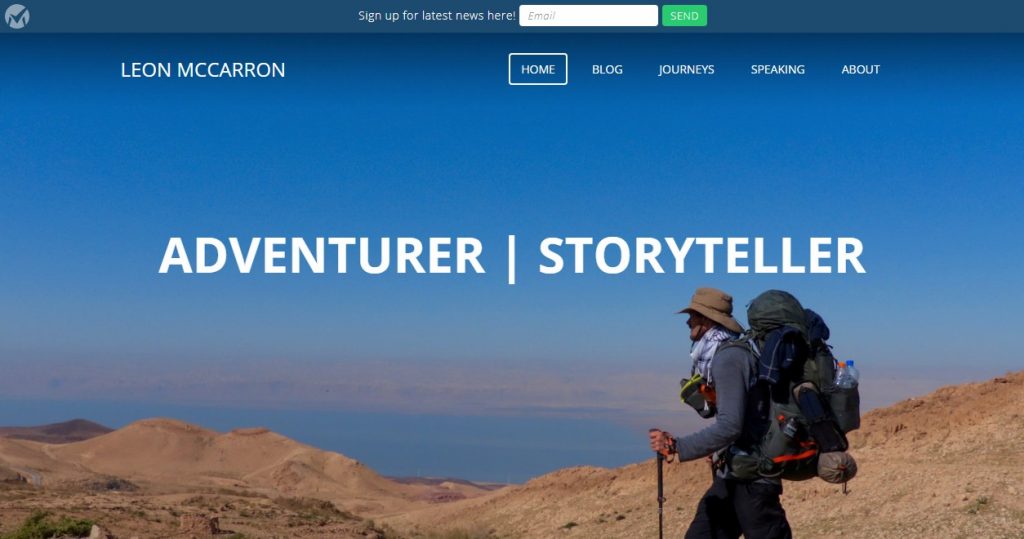Can you make a living from adventure?
Leon McCarron knows a thing or two about adventure.
“This is, I believe, a new golden age of adventure, where it has become democratized—we don’t necessarily need vast endowments to fund travel, nor is there a need to rely on television or big-money book deals for a platform. The internet has given us all a soapbox to shout from, and it’s been a joy to see so many wonderful storytellers emerge in the last few years. Here’s to the next generation. You might even be a part of it,” UK native McCarron says.
McCarron should know.
At the end of 2012, he crossed 1000 miles of the Empty Quarter desert, roughly following the route of explorer Wilfred Thesiger and pulling a cart loaded with supplies, accompanied by fellow professional adventurer Alastair Humphreys. In May 2012 McCaroon concluded a 6-month, 3000 mile expedition walking the length of China, from the Gobi desert in Mongolia to South China Sea in Hong Kong. National Geographic produced a 4-part TV series of the journey. Other journeys include 14,000 miles solo and unsupported on a bicycle from New York to Hong Kong, a folding bike trip around the British Isles to climb the Six Peaks, a human-powered descent of the longest river in Iran, the Karun, and a crossing of Argentine Patagonia on horseback. In 2017 he was the recipient of the Royal Geographical Society’s Neville Shulman Challenge Award, and spent a month with the Israelite Samaritans documenting the way of life of perhaps the world’s smallest and oldest ethno-religious group.

As he writes in Adventure.com, he, like many people, was not sure when he left university what he wanted to do with his life.
“I wanted to do something that I could be proud of when I was old. I wanted to go on an adventure,” he says.
“I came up with a simple yet ambitious plan: I’d try to ride a bicycle as far around the world as a year’s worth of savings would take me.”
“Finally, 14,000 miles after setting off, I arrived in Hong Kong, my savings spent, but my memory bank full. I’d grown in confidence, developed all sorts of resilience and grit I didn’t know I had, and seen enough of the world to know how much more there was to explore,” he writes in Adventure.com.
MAKING AN INCOME
A combination of adventures, published stories, and public talks – plus frugal living – led to an income.
“Slowly, my expeditions became more professional, and the stories were collated in more savvy ways. I made films and wrote my first book, The Road Headed West, about cycling across North America. Encouraged by that, I’ve just published a second, The Land Beyond, which charts my 1000-mile walk through the Middle East,” he says.
STORYTELLING ON THE INTERNET
Clearly what is important to McCarron that sets his circumstances apart from adventurers some decades ago is the ability to tell stories and grab people’s attention through the internet.
McCarron’s adventures are tailored to an audience who might pick up on what he is doing through online stories, videos and Facebook and Instagram posts.
The key is building a following and enough interest so that people will pay for his books and films and turn up to events where he speaks.
This is not a way to get rich – though a few high-profile adventurers including Ed Stafford, Bear Grylls, and Roz Savage have done quite well out of it.
McCarron’s monetization of his adventures allows him to go on exciting trips and tell the resulting stories to an audience around the world.
This adventurous lifestyle might prove alluring to many but, as McCarron notes, it involves a lot of rather un-sexy work involving being tied to computers, filing tax returns, and hunting around for stints of work.
As McCarron points out, the adventures and status of people like adventurer Bear Grylls and rock climber Alex Honnold might appear alluring but their success is not replicable – they are top of their game.
LOVE WHAT YOU DO
Most modern-day adventurers fell into their career by accident rather than making adventure a career choice when they left school. For all the success stories there are hundreds of people who fail to make a buck out of wild and outlandish adventures.
Clearly the bottom line is to love what you are doing and be highly motivated before you set off from your front door.
And being a professional adventurer involves an exceptional amount of hard work, as McCarron points out.
As he writes in Adventure.com, over time it should become obvious which niche you are suited to. If it is writing, write. If it is filming, film. And if you have particular adventure skills, work on them.
If your adventures catch people’s attention and you build a following, it is then important to develop ways to monetize so that you can continue to venture into the wilds and make money from it.
Build up enough momentum and then you may legitimately be able to call yourself a professional adventurer.

